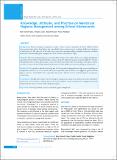Please use this identifier to cite or link to this item:
https://hdl.handle.net/20.500.14356/1633Full metadata record
| DC Field | Value | Language |
|---|---|---|
| dc.contributor.author | Yadav, Ram Naresh | - |
| dc.contributor.author | Joshi, Shrijana | - |
| dc.contributor.author | Poudel, Rajesh | - |
| dc.contributor.author | Pandeya, Pawan | - |
| dc.date.accessioned | 2023-05-17T05:45:31Z | - |
| dc.date.available | 2023-05-17T05:45:31Z | - |
| dc.date.issued | 2017 | - |
| dc.identifier.citation | YadavR. N., JoshiS., PoudelR., & PandeyaP. (2018). Knowledge, Attitude, and Practice on Menstrual Hygiene Management among School Adolescents. Journal of Nepal Health Research Council, 15(3), 212-216. https://doi.org/10.33314/jnhrc.v15i3.1164 | en_US |
| dc.identifier.issn | Print ISSN: 1727-5482; Online ISSN: 1999-6217 | - |
| dc.identifier.uri | http://103.69.126.140:8080/handle/20.500.14356/1633 | - |
| dc.description | Original Article | en_US |
| dc.description.abstract | Abstract Background: Menstrual hygiene management remains a taboo in many communities in Nepal. Cultural beliefs about menstruation such as food taboos and untouchability have negative impact on dignity, health and education of adolescent girls. The objective of the study was to assess the current knowledge, attitude and practice of school adolescents on menstrual hygiene management in Doti District in Far-Western Nepal. Methods: This cross-sectional study was carried out from October to December 2016 at seven village development committees in Doti district, Nepal. This study was done among 276 students from grade seven and eight of 11 schools. Self-administered structured questionnaire was used to obtain information from school students. Descriptive analysis was done to analyse the knowledge, attitude and practice of school adolescents on menstrual hygiene management. Results: 67.4% respondents had fair knowledge and 26.4% respondents had good knowledge on menstrual hygiene management. However, out of 141 female adolescent respondents, only 56 (40%) were engaged in good menstrual hygiene practices. Around half of the respondents had positive attitude towards menstrual hygiene management related issues. Conclusions: Although knowledge on menstrual hygiene management among school adolescents is fair, still attitude and practice need to improve. Findings indicate the need of behavior change communication campaigns along with frequent reinforcement of school health education programs. Keywords: Knowledge; attitude; practice; menstrual hygiene management . | en_US |
| dc.language.iso | en | en_US |
| dc.publisher | Nepal Health Research Council | en_US |
| dc.relation.ispartofseries | Sep-Dec, 2017;1164 | - |
| dc.subject | Knowledge | en_US |
| dc.subject | Attitude | en_US |
| dc.subject | Practice | en_US |
| dc.subject | Menstrual hygiene management | en_US |
| dc.title | Knowledge, Attitude, and Practice on Menstrual Hygiene Management among School Adolescents | en_US |
| dc.type | Journal Article | en_US |
| local.journal.category | Original Article | - |
| Appears in Collections: | Vol. 15 No. 3 Issue 37 Sep-Dec 2017 | |
Files in This Item:
| File | Description | Size | Format | |
|---|---|---|---|---|
| 1164-Manuscript-3041-1-10-20180101.pdf | Fulltext Download | 189.29 kB | Adobe PDF |  View/Open |
Items in DSpace are protected by copyright, with all rights reserved, unless otherwise indicated.
